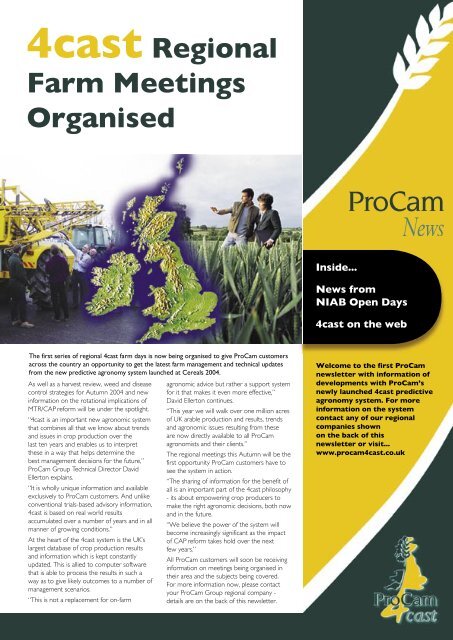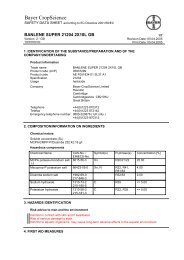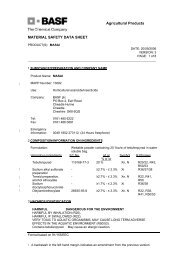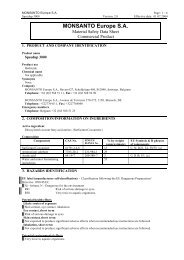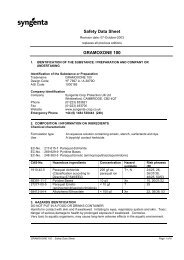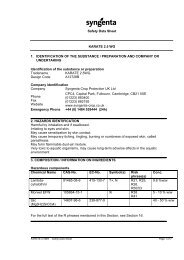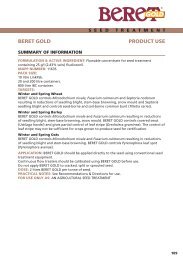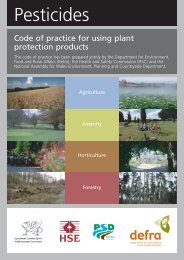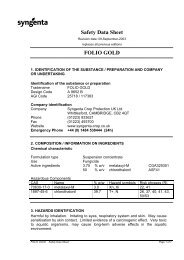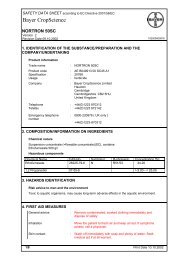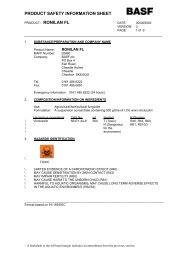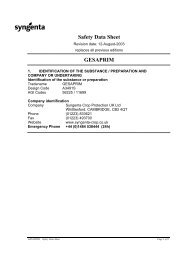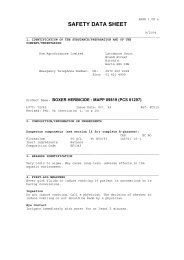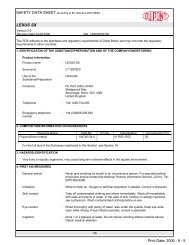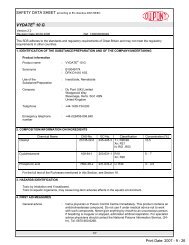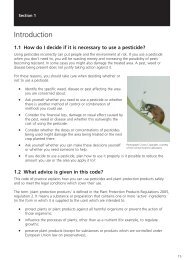4cast Regional Farm Meetings Organised - Rutherfords
4cast Regional Farm Meetings Organised - Rutherfords
4cast Regional Farm Meetings Organised - Rutherfords
You also want an ePaper? Increase the reach of your titles
YUMPU automatically turns print PDFs into web optimized ePapers that Google loves.
<strong>4cast</strong> <strong>Regional</strong><br />
<strong>Farm</strong> <strong>Meetings</strong><br />
<strong>Organised</strong><br />
Inside...<br />
News from<br />
NIAB Open Days<br />
<strong>4cast</strong> on the web<br />
The first series of regional <strong>4cast</strong> farm days is now being organised to give ProCam customers<br />
across the country an opportunity to get the latest farm management and technical updates<br />
from the new predictive agronomy system launched at Cereals 2004.<br />
As well as a harvest review, weed and disease<br />
control strategies for Autumn 2004 and new<br />
information on the rotational implications of<br />
MTR/CAP reform will be under the spotlight.<br />
“<strong>4cast</strong> is an important new agronomic system<br />
that combines all that we know about trends<br />
and issues in crop production over the<br />
last ten years and enables us to interpret<br />
these in a way that helps determine the<br />
best management decisions for the future,”<br />
ProCam Group Technical Director David<br />
Ellerton explains.<br />
“It is wholly unique information and available<br />
exclusively to ProCam customers. And unlike<br />
conventional trials-based advisory information,<br />
<strong>4cast</strong> is based on real world results<br />
accumulated over a number of years and in all<br />
manner of growing conditions.”<br />
At the heart of the <strong>4cast</strong> system is the UK’s<br />
largest database of crop production results<br />
and information which is kept constantly<br />
updated. This is allied to computer software<br />
that is able to process the results in such a<br />
way as to give likely outcomes to a number of<br />
management scenarios.<br />
“This is not a replacement for on-farm<br />
agronomic advice but rather a support system<br />
for it that makes it even more effective,”<br />
David Ellerton continues.<br />
“This year we will walk over one million acres<br />
of UK arable production and results, trends<br />
and agronomic issues resulting from these<br />
are now directly available to all ProCam<br />
agronomists and their clients.”<br />
The regional meetings this Autumn will be the<br />
first opportunity ProCam customers have to<br />
see the system in action.<br />
“The sharing of information for the benefit of<br />
all is an important part of the <strong>4cast</strong> philosophy<br />
- its about empowering crop producers to<br />
make the right agronomic decisions, both now<br />
and in the future.<br />
“We believe the power of the system will<br />
become increasingly significant as the impact<br />
of CAP reform takes hold over the next<br />
few years.”<br />
All ProCam customers will soon be receiving<br />
information on meetings being organised in<br />
their area and the subjects being covered.<br />
For more information now, please contact<br />
your ProCam Group regional company -<br />
details are on the back of this newsletter.<br />
Welcome to the first ProCam<br />
newsletter with information of<br />
developments with ProCam’s<br />
newly launched <strong>4cast</strong> predictive<br />
agronomy system. For more<br />
information on the system<br />
contact any of our regional<br />
companies shown<br />
on the back of this<br />
newsletter or visit...<br />
www.procam<strong>4cast</strong>.co.uk
£50,000 Margin Increase<br />
OSR now plays an increasingly<br />
important role in the rotation at the<br />
Yorkshire farm of Michael Scholey<br />
(right) following ProCam <strong>4cast</strong><br />
information provided by<br />
agronomist Neil Moxon (left).<br />
Gross margins at Wilstrop Grange<br />
<strong>Farm</strong> in Yorkshire are on track<br />
to increase by £50,000 since the<br />
adoption of ProCam technical<br />
advice supported by the <strong>4cast</strong><br />
agronomy system.<br />
From a figure of £113,000 in 2001 to last<br />
year’s gross margin of £141,000, budgeted<br />
figures for this year are £163,000 as a result<br />
of the more cost-effective use of inputs and<br />
optimisation of yields provided by the system.<br />
“It’s been a real eye opener,” says Michael<br />
Scholey who has run the 500 acre arable unit<br />
at Kirk Hammerton near York for over 20<br />
years. The farm has been one of many that<br />
have helped develop the <strong>4cast</strong> system prior to<br />
its national launch at Cereals 2004.<br />
“The ability to see what the best growers<br />
in the UK are doing and then put this into<br />
action with specialist local knowledge from our<br />
ProCam agronomist, has quite literally changed<br />
the way we farm.”<br />
“In terms of benchmarking, it’s also showed<br />
us that some of the best production units are<br />
based in the North with margins to rival the<br />
best of them!”<br />
The impact of <strong>4cast</strong> has been felt across many<br />
areas including seed rates, fertiliser regimes<br />
and cropping plans as well as insecticide,<br />
fungicide and herbicide policies. The farm’s<br />
new rotational plan is a good example of the<br />
system in action.<br />
“We’ve sat down with our ProCam<br />
agronomist Neil Moxon, and been able to<br />
look at individual crop profitability over the last<br />
10 years and this prompted us to ask serious<br />
questions about beans in the rotation. We<br />
were then able to analyse our own costs and<br />
margins and as a result have now dropped<br />
beans from the rotation.<br />
“The ability to see what<br />
the best growers in the<br />
UK are doing and then<br />
put this into action with<br />
specialist local knowledge<br />
from our ProCam<br />
agronomist has quite<br />
literally changed the<br />
way we farm.”<br />
“Cropping for this year is now 240 acres of<br />
Driving down<br />
costs<br />
A key feature of the <strong>4cast</strong> system is that<br />
it can calculate production costs down<br />
to pennies and predict the effects of<br />
management decisions on margins with<br />
surprising accuracy, says ProCam<br />
agronomist Neil Moxon.<br />
“Michael and I can work out costs across all<br />
management areas and then compare these<br />
with the best producers in the UK to further<br />
fine-tune the decisions we make. Over the last<br />
two years, the predictions of outcome have<br />
been within 5% of the actuals we achieve.”<br />
Michael’s farm has actually staged several<br />
farm meetings to spread the word about cost<br />
management and other key issues to local<br />
arable producers.<br />
“At the heart of the <strong>4cast</strong> system is the<br />
collation of information from arable units all<br />
over the country, the processing of this to<br />
draw out the best management options and<br />
Winter Wheat and 250 acres of OSR and<br />
we will use a simple 1:1 rotation in the future<br />
because that is what <strong>4cast</strong> shows is the most<br />
consistently profitable combination.”<br />
The system also facilitates Michael’s use of<br />
variable rate fertiliser application through soil<br />
testing and mapping which can then be used<br />
to apply the most economic levels of P + K<br />
across the farm.<br />
“In this day and age, the quality of technical<br />
advice is the difference between making<br />
money and going under. ProCam <strong>4cast</strong> is now<br />
an essential part of our management.”<br />
Neil Moxon<br />
then the communication of this to all<br />
ProCam users,” Neil says.<br />
“We’ve organised a lot of meetings and<br />
covered a lot of subjects including cost<br />
management stewardship schemes and<br />
varietal choice. The next meeting in<br />
Autumn will feature a national review of<br />
harvest and a look at modulation - we’re<br />
expecting about 50 - 60 local farmers.”
Varieties were not the only thing to come under the spotlight at two Open Days organised<br />
by ProCam at NIAB. Crop production decisions for 2005 in light of new information from<br />
the <strong>4cast</strong> system and impending implications of CAP Reform were also on the agenda.<br />
2005 Blackgrass<br />
Threat Grows<br />
2005 could be the year of a major<br />
Blackgrass resurgence unless crop<br />
producers plan their weed control<br />
policies very carefully, warns<br />
ProCam Technical Director<br />
Dr. David Ellerton.<br />
Speaking at the Procam <strong>4cast</strong> Open Day<br />
at NIAB, Dr. Ellerton said the twin perils of<br />
increasing herbicide resistance and growers<br />
trying to take short cuts in weed control<br />
policy were potentially creating a real threat<br />
for next year.<br />
Accessing crop records stretching back to 1979<br />
through ProCam’s <strong>4cast</strong> predictive agronomy<br />
system, he said whilst the number of active<br />
ingredients now available for weed control had<br />
grown from 22 to 35 over the last 25 years,<br />
herbicide resistance had escalated rapidly in the<br />
last five years.<br />
“With herbicide sales reaching a peak in 1996,<br />
our annual usage is now back to similar levels<br />
of 20 years ago but the most worrying<br />
feature is growing herbicide resistance.<br />
Even the mainstay chemical groups such as<br />
SUs and Fops are susceptible.<br />
“We now have a situation where 50% of the<br />
most competitive weeds are showing significant<br />
signs of resistance,” he explained. “With<br />
Mayweed now showing signs of resistance,<br />
Crop Rotation Caution in 2005<br />
A group of arable farmers inspect the latest varieties and the effects of seed treatments at the ProCam<br />
NIAB Open Days 2004.<br />
“We now have<br />
a situation<br />
where 50% of the<br />
most competitive<br />
weeds are<br />
now showing<br />
significant signs<br />
of resistance.”<br />
The loss of Area Aid will have a far greater impact on choice of crop in 2005 than many<br />
people imagine and growers really need to get to grip with their rotations in light of this,<br />
warns ProCam technical agronomist Nick Myers.<br />
Speaking at the Procam <strong>4cast</strong> Open<br />
Days, Nick Myers said removing Area<br />
Aid payments from gross margin results<br />
for all crops over since the late 80’s had<br />
highlighted the vulnerability of some key<br />
crops in the rotation.<br />
“There might be sound agronomic reasons<br />
why certain break crops need to be grown,<br />
but the profitability of many will be seriously<br />
suspect in the future,” he said.<br />
“Our <strong>4cast</strong> data for the last 5 years shows<br />
first Wheat is the most profitable and<br />
consistently performing crop by some<br />
margin and the best performing break crop<br />
is Winter OSR.”<br />
Using the ProCam data with Area Aid<br />
removed shows the average gross margin for<br />
first Wheat in 2003 being £464/ha and that<br />
for second and third Wheats being £375/ha.<br />
Furthermore, the top 25% of producers<br />
achieved margins without Area Aid of<br />
£612/ha for first Wheat and £522/ha for<br />
second and third Wheats - nearly 32%<br />
higher on first Wheats than the average.<br />
The top 25% of producers also achieved<br />
margins without Area Aid of £515/ha for<br />
Winter OSR compared with an average<br />
£364/ha. No other break crop came close<br />
to these levels of profitability.<br />
“There may be reasons such as weed<br />
control and spreading workload that suggest<br />
other regimes, but if you can, Winter Wheat<br />
and Winter OSR is the most profitable<br />
combination,” Nick Myers said.<br />
“Fixed costs too need careful management.<br />
Establishment costs make up 40% of fixed<br />
costs on average so now might be the time<br />
to look at reduced tillage options as well.”<br />
we have 6 out of the 12 most injurious weed<br />
species with significant resistance - and<br />
it’s growing.”<br />
In areas of high risk, both appropriate<br />
pre-drilling and pre-emergence treatments<br />
are critical and growers should practice a<br />
combination of both cultural and chemical<br />
controls within a field specific policy.<br />
“Our <strong>4cast</strong> data consistently shows that crop<br />
yield response to herbicide input is flat, so<br />
unlike fungicides there is no yield advantage to<br />
using more than you have to. The herbicide<br />
rule is use as much as necessary but as little<br />
as possible.”<br />
The top 25% of producers by crop yield and<br />
margin in fact spend on average £3/tonne<br />
on herbicides and the bottom 25% spend<br />
£6/tonne.<br />
“The message is clear,” Dr. Ellerton says. “Stay<br />
on top of your herbicide policy, don’t miss<br />
critical timings and don’t try and cut back on<br />
dose rate - it will only cost more in the long<br />
run as our data clearly shows.”
4-cast on the Web<br />
As well as accessing <strong>4cast</strong> information through one-to-one<br />
consultation with your agronomist and through our series of regional<br />
meetings throughout the year, you can get the latest information on<br />
the system from the new ProCam <strong>4cast</strong> website.<br />
As well as downloading technical updates, details of upcoming<br />
regional events and the latest news, you can also use the site to<br />
arrange appointments with your agronomist.<br />
The site is regularly updated, so for the latest <strong>4cast</strong> news visit...<br />
www.procam<strong>4cast</strong>.co.uk<br />
Did you know?<br />
•ProCam now employs more professional agronomists<br />
walking more acres than any other organisation in the UK.<br />
•In 2004, ProCam agronomists will walk over one million<br />
acres of arable land.<br />
•The <strong>4cast</strong> database is made up of 10 years of results and<br />
covers all manner of varieties, crop management regimes<br />
and growing conditions.<br />
To find out more about<br />
ProCam and ProCam<br />
<strong>4cast</strong> contact any of<br />
the ProCam group<br />
companies below.<br />
County Crops<br />
01704 895888<br />
Prochem<br />
01672 539591<br />
Glasgow<br />
BURSCOUGH<br />
Inverness<br />
KILDARY<br />
Edinburgh<br />
CUMINESTOWN<br />
Newcastle Upon Tyne<br />
THIRSK<br />
Manchester<br />
GAMSTON<br />
Scarborough<br />
TOPCLIFFE<br />
York<br />
Leeds<br />
DRIFFIELD<br />
Robertson<br />
Crop Services<br />
01862 842552<br />
Fieldcare<br />
North: 01845 537555<br />
South: 01777 839000<br />
BCS Agriculture<br />
01377 240118<br />
ProCam<br />
Agriculture<br />
01763 261592<br />
01763 263031<br />
Chemega<br />
01672 539591<br />
LEOMINSTER<br />
Bristol<br />
FROME<br />
Birmingham<br />
Southampton<br />
Swindon<br />
MELBOURN<br />
WINTERBOURNE<br />
London<br />
Cambridge<br />
Norwich<br />
LANGHAM<br />
CHICHESTER<br />
BETHERSDEN<br />
Dover<br />
LEWES<br />
JD Rutherford<br />
01273 478860<br />
ProCam News is published by the<br />
The ProCam Group Ltd.<br />
Saxon Way, Melbourn<br />
Royston, Hertfordshire SG8 6DN<br />
Telephone: 01763 261587<br />
Fax: 01763 261271<br />
www.procam.co.uk<br />
www.procam<strong>4cast</strong>.co.uk


